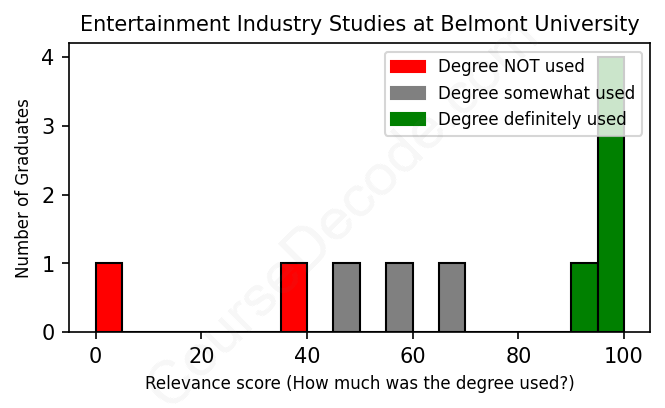
First, some facts. Of the Entertainment Industry Studies graduates from Belmont University we've analyzed , here's how many have used (or NOT used) their degree in their career:

These are estimates based on AI analysis of 10 LinkedIn profiles (see below).
The verdict? Slightly above average. Overall, with an average relevance score of 69%, Entertainment Industry Studies graduates from Belmont University have a slightly higher likelihood (+2%) of finding work in this field compared to the average graduate across all fields:
And for comparison, here's the chart for all profiles we've looked at across all degrees.
Also, after graduating, only 0% of these graduates have pursued further education other than another Bachelor's degree (such as a Masters degree or other), compared to the average across all profiles of 35%. This suggests a Bachelors degree is enough for most Entertainment Industry Studies graduates, and it's normal to look for work straight after graduation.
See the details:
|
Relevance score: 100% We think this person has gone into a career highly relevant to their degree. We think this person has gone into a career highly relevant to their degree.
DEGREE INFOGraduated in 2018 from Belmont University with a Bachelor of Arts (B.A.) in Entertainment Industry Studies. No other secondary education since. JOB HISTORY SINCE GRADUATIONTour Department Assistant Level Group Ltd. Oct 2022 - Present ABOUTDetail-oriented entertainment industry professional bringing forth expertise in administrative responsibilities within fast-paced, creative environments. Extensive experience in communication and management roles with a proven ability to multitask efficiently. Adept at organization with a self-motivated work ethic. Passionate about storytelling in both visual and audio mediums. |
The top 10 most common jobs done by the graduates we've analyzed (ranked most common to least) are:
When looking at the job trajectories of Belmont University graduates with a degree in Entertainment Industry Studies, there seems to be a mix of relevance to their field of study. A lot of graduates have landed roles such as Graphic Designers, Casting Assistants, and Music Coordinators, which are directly aligned with what they learned during their studies. These positions require skills in visual communication, talent management, and music supervision, making them fairly relevant to the entertainment industry. However, there are also many graduates who have taken on roles that seem quite disconnected from their degree, such as working in fast food, retail sales, or even as a Delivery Driver Helper. These jobs often focus more on customer service or logistics, which don't really tap into the entertainment skills they did learn.
Overall, while there are some standout roles that clearly relate to the entertainment industry, a significant portion of graduates have found themselves in positions that are not directly relevant. It seems like, although the degree can open doors, not every job these folks end up in will utilize the specific knowledge and expertise of their studies. It’s important for graduates to seek out experiences and internships during their time at university that can help bridge that gap, so they can enter roles that truly reflect their education in the entertainment industry.
Here is a visual representation of the most common words in job titles for Entertainment Industry Studies graduates (this is across all Entertainment Industry Studies graduates we've analyzed, not just those who went to Belmont University):

When it comes to graduates from Belmont University's Entertainment Industry Studies program, you can see a range of career trajectories that show varying levels of success related to their degrees. Right after graduation, many folks are diving into roles that aren't directly tied to their studies. For example, you’ve got some taking on jobs like sales associates or even delivery drivers. This can be pretty common, especially in the first few years when people are still figuring out what they want to do or when they are looking for any job that pays the bills. But it’s not all bad—some do land internships or entry-level positions in their field, like music management or graphic design, which can help them build experience.
Fast forward five to ten years down the line, and you start to see a more promising picture. A number of these graduates eventually find their way into roles that align with the entertainment industry, such as casting assistants or music coordinators. While some may have veered off into unrelated fields, others have successfully carved out careers in arts, media, and production roles that are more connected to their studies. Overall, it looks like many graduates end up in jobs that either relate to the entertainment field or leverage their skills in creative ways, even if it takes a bit of wandering before they settle into a career that feels right for them.
Honestly, a Bachelor’s degree in Entertainment Industry Studies can be a mix of easy and challenging, depending on your interests and skills. At Belmont, you’re diving deep into a blend of creative and technical subjects, like production, marketing, and maybe even some business stuff, which can be a bit overwhelming if you're not super passionate about it. Some students find certain classes like music theory or film analysis pretty tough, while others cruise through the parts that involve hands-on projects or collaboration. It really comes down to how much you enjoy the material and how well you handle juggling different tasks, but overall, it’s definitely not the easiest degree out there—it requires a solid commitment, but if you love the industry, it makes the hard work a bit more bearable!
Most commonly, in the LinkedIn profiles we've looked at, it takes people 4 years to finish a Bachelor degree in Entertainment Industry Studies.
So, looking at these Belmont grads, it seems like they're kind of in a mixed bag when it comes to making decent money. A few of them started off in low-paying or part-time gigs like working at Taco Bell and as a Denny's cook, which really doesn't set them up to rake in the cash right away. But then, some have moved into roles that could offer better pay, like the Director of Client Services or even the Communications Coordinator. The ones in creative roles, like graphic design and music supervision, might have more potential for a decent paycheck, especially as they gain experience. Overall, it looks like while some are doing okay, others are still grinding in jobs that pay on the lower end, so it seems like they’re still figuring things out financially.
Here is a visual representation of the most common words seen in the "about" section of LinkedIn profiles who have a Bachelor degree in Entertainment Industry Studies (this is across all Entertainment Industry Studies graduates we've analyzed, not just those who went to Belmont University). This may or may not be useful:

Here are all colleges offering a Bachelor degree in Entertainment Industry Studies (ordered by the average relevance score of their Entertainment Industry Studies graduates, best to worst) where we have analyzed at least 10 of their graduates:
| College | Score | Count |
|---|---|---|
 Belmont University Belmont University
|
69 | 10 |